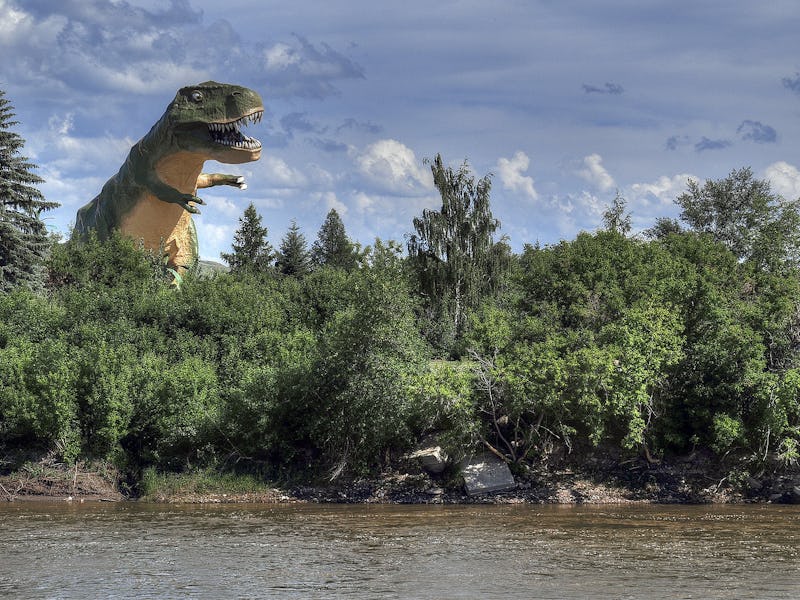Exploring Canada's Socialist Dinosaur Paradise
The bones belong to the people.

I’ve got a dinosaur in my pocket right now. It doesn’t belong to me, although I didn’t steal it.
OK, I admit, it’s not a whole dinosaur. The whole thing fits inside my closed fist. There’s a small section of bone surface material, and the rest is spongy marrow. It’s small, but appears to have come from a much larger bone from a big animal. It’s probably a chunk of bone that belonged to an unknown ornithischian that lived in the late Cretaceous period, not too long before they nearly all went extinct.
I found the bone at a paleontological dig site north of Drumheller, Alberta, the heart of Canada’s dinosaur country. Here, on the steep cliff banks of the Red Deer river, the remains of a lost world are eroding out and seeing the light of day for the first time in 70 million years. The site is so rich, there are dinosaur pieces just about everywhere you look.
My dinosaur discovery.
“We’re spoiled,” says François Therrien, curator of dinosaur paleoecology with the Royal Tyrrell Museum and chief scientist on the dig. Paleontologists have little interest in the scattered fragments at the surface, which retain little information about where they came from and are unlikely to be connected back into a larger skeleton. They focus efforts instead on excavating bones still stuck in place on the hillside, where it might be part of a more complete animal hiding deeper within.
But just because the scientists don’t want them doesn’t make it a free-for-all for the rest of us. It’s nearly impossible to legally pick up a fossil and put it in your pocket in Alberta. The province has among the most restrictive regulations for fossil collecting in the world.
Paleontologist François Therrien overlooks his dig site by the Red Deer River in Alberta.
You can’t collect in public parks or protected areas. If you’re on private land, you must have the permission of the owner to take any fossils off of it. You can only pick up loose rocks from the surface — anything still stuck in the rock in came from, even just a little bit, has to be left alone.
I met these conditions. The dig site was on a private ranch, and Therrien gave the OK to pocket my find. Even so, it doesn’t technically belong to me. According to the law, the fossil belongs to the people of Alberta, and I am only holding it in trust on their behalf. I may not sell it, I may not alter or make it into jewelry, and I may not take it out of the province.
The rules are almost absurdly socialist, especially when compared to just south of the border in Montana, where commercial fossil hunting is both big money and big controversy. The idea that a chunk of rock in my pocket should still be subject to such intense government regulation seems a little silly.
François Therrien points out a dinosaur bone, probably part of a hadrosaur hip, that technicians are working to excavate from the hillside.
But paleontologists here, including Therrien, say the law works well to reduce conflict over bones, and to ensure that dinosaurs stay close to home where they can benefit science, public museums, and local tourism.
If I take my fossil home with me, I’ll be breaking Alberta’s law and stealing it by bringing it into the neighboring province of British Columbia. There would almost certainly be no consequence to this, since no one at the unmanned border will be checking.
What I’ll probably do, though, is hand the fossil over to someone who lives here before I leave. I’ll just make sure they know it doesn’t belong to them — they’re just holding it in public trust for some time.